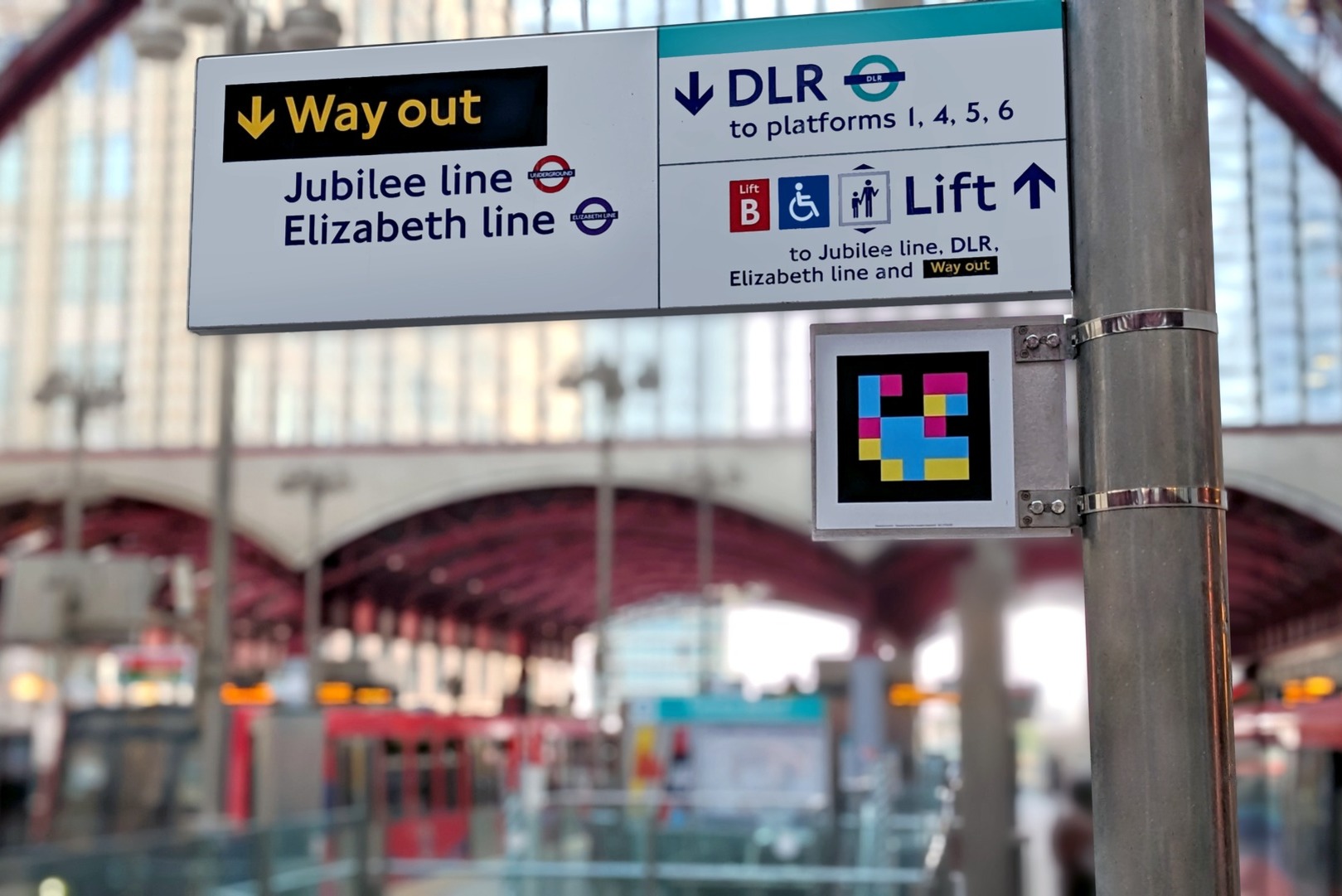DLR trial new technology to help the blind and partially-sighted
Posted on 4th July 2023 at 10:58
Transport for London (TfL) and KeolisAmey Docklands, operator of the DLR, have partnered with GoMedia (a subsidiary of Icomera) and The Royal National Institute of Blind People (RNIB) to trial NaviLens, an app designed to help blind or partially-sighted customers navigate stations. The trial will take place at Cutty Sark, Canary Wharf, Woolwich Arsenal, and Tower Gateway DLR stations for six months.
NaviLens is designed specifically to enable blind and partially-sighted people to access and locate information and interact with their environment, particularly in busy areas like train stations. NaviLens' technology has seen successful deployments in New York Metro, Barcelona, and Los Angeles. It is even used beyond transport, such as in supermarkets on some Kellogg's packaging, to provide ingredient information.
NaviLens technology is based on image recognition using augmented smart codes, placed along designated customer itineraries, and a smartphone app that provides voice guidance for visually impaired passengers. Once the smart codes have been scanned using the NaviLens app, users can benefit from the help of the app's voice assistant to continue their journey, the voice assistant having told them practical information including description of a physical element, guidance indications and real-time DLR arrivals and departures.
The trial of NaviLens will be supported by audio announcements at stations, members of staff at Woolwich Arsenal DLR station and Passenger Service Agents that are onboard all DLR trains to assist passengers. The technology could also support those hampered by language barriers, or passengers unfamiliar with London: the NaviLens app can transmit the information encapsulated in the smart codes in augmented reality, in 33 different languages.
TfL is actively pursuing innovation, and in particular is working with KeolisAmey Docklands to use the DLR as a testbed to help improve customer experience and decarbonisation right across the network.
Seb Dance, Deputy Mayor for Transport said: "Encouraging greater use of public transport is a top priority for the Mayor, and the NaviLens app should make a real difference for partially-sighted customers and help make London's transport network accessible to all. The DLR is one of the most accessible modes of transport on our network and this new technology will go even further to help customers with access needs travel with ease, building a better, safer and fairer London for all."
Tom Page, General Manager of the DLR at TfL, said: "Customers are at the heart of everything we do. With step-free access across the DLR network, the NaviLens technology will allow us to use four stations to trial how we can best serve everyone, including those with accessibility needs or needing to access information in other languages. NaviLens will work alongside Passenger Service Agents that are onboard all DLR trains, and we will work with our partners KeolisAmey Docklands, GoMedia and The Royal National Institute of Blind People to review the trial once it has concluded."

Transport for London and KeolisAmey Docklands trial new NaviLens technology at DLR stations to help blind and partially sighted customers navigate the network
Andrew Dickinson, Service Delivery Director at KeolisAmey Docklands, said: "KeolisAmey Docklands are excited to trial the innovative NaviLens technology in partnership with GoMedia, RNIB and Transport for London. We are proud to operate the DLR serving our customers, communities and businesses in east London. We continually look to improve and make our railway even more accessible to all.
"This trial is an exciting partnership collaboratively working to improve the customer experience for those who are partially sighted or fully blind. By embracing and building on technological developments we can build the connectivity of the Docklands area to those living around it.
"We will also be developing the trial to see how it can help us with other areas of customer communication and provision of service information."
Robin Spinks, RNIB Head of Inclusive Design, said: "Navigating train and light rail stations can be a very daunting and anxiety provoking experience for people living with blindness or partial sight.
"As someone who is registered severely sight impaired, I can struggle to navigate around train stations as the signs are often inaccessible to me. I don't want special treatment; I just want access to the same information that everyone else takes for granted.
"RNIB is delighted to be involved in this partnership, where NaviLens technology is enabling more confident, independent travel for people like me."
Roger Matthews, Managing Director of GoMedia and Chief Commercial Officer of its parent company Icomera said: "GoMedia's live cloud-based passenger information system will be used to deliver accurate, content-rich, location-based information to users of the Navilens app. The trial does not require the installation of any additional physical infrastructure aside from the optical smart code stickers, so it presents a fast and cost-effective accessibility win for transport infrastructure owners and operators."
Tagged as: TfL, DLR
Share this post:

